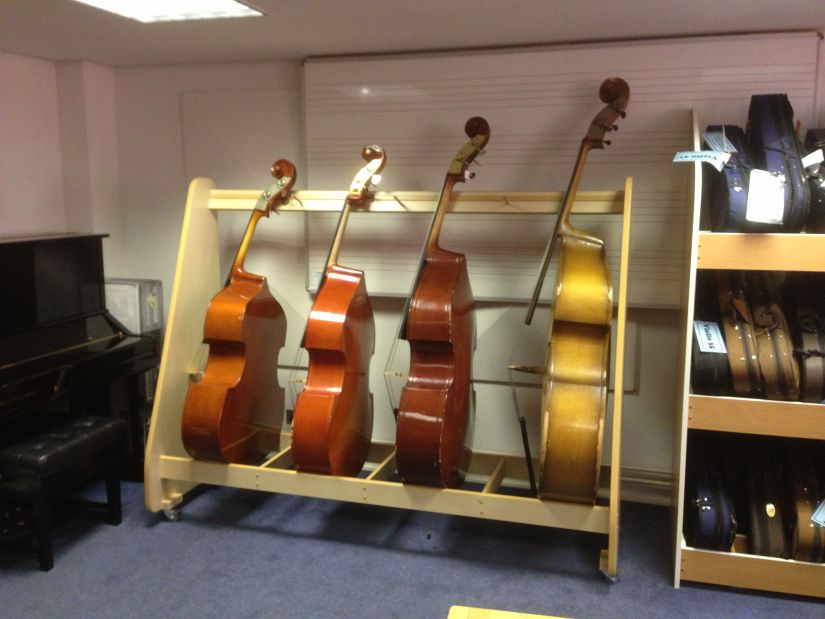Self-Storage for Musicians: Storing Instruments and Equipment Safely
As a musician, your instruments and equipment are not just tools—they're the heart of your creative expression. Whether you're a touring professional, a local band member, or an avid hobbyist, taking care of your gear is essential to maintaining its performance and longevity. However, finding space to store your instruments and equipment can be a challenge. That's where self-storage comes in.
Self-storage units offer a convenient and secure solution for storing musical gear, allowing you to keep your instruments in top condition, even if you don’t have the space at home. Here's everything you need to know about using self-storage to safely store your music gear.
Why Use Self-Storage for Musical Instruments and Equipment?
Musicians face several challenges when it comes to storing their instruments and equipment. Instruments like guitars, pianos, or violins are sensitive to temperature and humidity changes, while electronic equipment, amplifiers, and speakers are prone to damage if not properly stored. Self-storage can provide:
1. Space for Large Instruments and Gear
Self-storage units offer a variety of sizes, so whether you need to store a large piano or multiple amplifiers and speaker systems, you can find a unit that meets your needs. This gives musicians more space at home to work, rehearse, and practice while still keeping their valuable equipment safe.
2. Climate-Controlled Storage for Sensitive Instruments
Certain instruments, like woodwinds, violins, and brass, are sensitive to environmental factors such as temperature and humidity. Extreme fluctuations can cause the wood to crack, warp, or lose its tonal quality. A climate-controlled storage unit keeps the temperature and humidity levels stable, ensuring that your instruments stay in prime condition, even during the harshest seasons.
3. Enhanced Security
Musical instruments and equipment are often costly and can be easy targets for theft. Self-storage facilities typically have strong security features, including 24/7 surveillance cameras, secure entry points, and on-site personnel. Many also offer individual locks for each unit, ensuring that your gear is kept safe when you're not around.
4. Convenience and Accessibility
With self-storage, you can access your instruments and equipment whenever you need them. Most facilities allow 24/7 access to your unit, meaning you can pick up or drop off gear at your convenience. This is particularly beneficial for musicians who need to store their instruments between gigs or practice sessions.
Tips for Storing Musical Instruments and Equipment in Self-Storage
To make sure your musical gear stays in excellent condition while in storage, here are a few tips for proper storage:
1. Pack Instruments Properly
Before storing your instruments, pack them carefully to avoid any damage. For example:
- Guitars: Store guitars in padded cases or gig bags to protect them from scratches or dings. For added protection, consider loosening the strings slightly to reduce tension on the neck.
- Drums: For drums, disassemble them to save space and prevent any accidental damage. Store cymbals separately and use a case to protect them from scratches.
- Brass and Woodwind Instruments: For brass instruments, clean them thoroughly before storage, and for woodwinds, use a case or padded bag to protect them from dust and moisture.
2. Consider a Climate-Controlled Unit
As mentioned earlier, sensitive instruments require a stable environment to preserve their integrity. If you’re storing high-value or delicate instruments, opt for a climate-controlled unit. These units help prevent moisture damage, rust, and changes in the instrument’s material properties.
3. Store Equipment in Original Cases or Containers
For equipment like microphones, sound mixers, amplifiers, and speakers, it’s best to store them in their original cases or padded containers. These cases were designed to protect the equipment from shock, dust, and temperature changes. If you no longer have the original cases, invest in sturdy, foam-padded cases for added protection.
4. Use Shelving or Racks for Organization
Inside your storage unit, you can maximize space by using shelves, racks, or even hooks to keep everything organized. This helps avoid clutter and ensures that your equipment is not piled up, which could cause damage. It also makes it easier to find what you need when you need it.
5. Label Your Gear
If you store multiple pieces of equipment, it’s a good idea to label your cases or boxes. This makes it much easier to locate specific instruments or equipment, especially if you’re storing gear for long periods of time. Labeling also helps protect valuable items from being forgotten or misplaced.
6. Check on Your Gear Regularly
Even though your gear is safely stored, it’s important to check on it regularly to ensure everything remains in good condition. This allows you to catch any issues early and address them before they become bigger problems. Make sure your gear is still clean, dry, and secure.
Benefits of Self-Storage for Touring Musicians
For touring musicians, self-storage is a game-changer. It offers a secure location to store extra gear when you’re on the road, preventing wear and tear on your equipment. Additionally, self-storage allows you to leave behind heavy items that are too cumbersome to travel with, such as backup amplifiers or extra drum kits. This way, your equipment remains protected and ready to use when you return.


